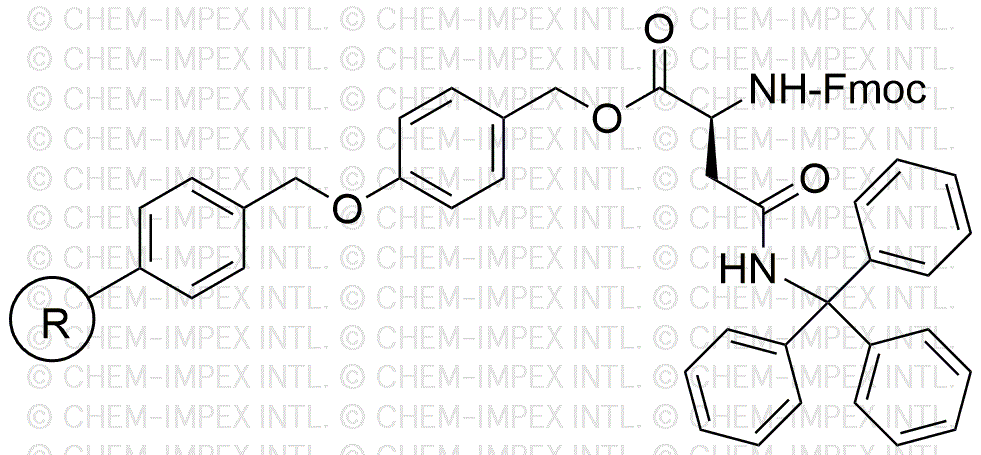Na-Fmoc-Ng-trityl-L-asparagine 4-alkoxybenzyl alcohol is widely utilized in research focused on:
- Peptide Synthesis: This compound serves as a key building block in the synthesis of peptides, enabling researchers to create complex proteins for various studies.
- Drug Development: It is used in the development of pharmaceutical compounds, particularly in creating targeted therapies that can improve treatment efficacy.
- Bioconjugation: The chemical is valuable in bioconjugation processes, allowing for the attachment of biomolecules to therapeutic agents, enhancing their delivery and effectiveness.
- Research in Neuroscience: It plays a role in synthesizing neuropeptides, which are crucial for understanding neurological functions and disorders.
- Custom Synthesis Services: Many research labs utilize this compound for custom synthesis, providing tailored solutions for specific experimental needs.
Informations générales
Propriétés
Sécurité et réglementation
Applications
Na-Fmoc-Ng-trityl-L-asparagine 4-alkoxybenzyl alcohol is widely utilized in research focused on:
- Peptide Synthesis: This compound serves as a key building block in the synthesis of peptides, enabling researchers to create complex proteins for various studies.
- Drug Development: It is used in the development of pharmaceutical compounds, particularly in creating targeted therapies that can improve treatment efficacy.
- Bioconjugation: The chemical is valuable in bioconjugation processes, allowing for the attachment of biomolecules to therapeutic agents, enhancing their delivery and effectiveness.
- Research in Neuroscience: It plays a role in synthesizing neuropeptides, which are crucial for understanding neurological functions and disorders.
- Custom Synthesis Services: Many research labs utilize this compound for custom synthesis, providing tailored solutions for specific experimental needs.
Documents
Fiches de données de sécurité (FDS)
La FDS fournit des informations de sécurité complètes sur la manipulation, le stockage et l’élimination du produit.
Spécifications du produit (PS)
Le PS fournit une description complète des propriétés du produit, notamment sa composition chimique, son état physique, sa pureté et les exigences de stockage. Il détaille également les plages de qualité acceptables et les applications prévues du produit.
Certificats d'analyse (COA)
Recherchez des certificats d'analyse (COA) en saisissant le numéro de lot du produit. Les numéros de lot et de lot se trouvent sur l'étiquette d'un produit, après les mots « Lot » ou « Lot de fabrication ».
Numéro de catalogue
Numéro de lot/série
Certificats d'origine (COO)
Ce certificat d'exploitation confirme le pays dans lequel le produit a été fabriqué, et détaille également les matériaux et composants utilisés et s'il est issu de sources naturelles, synthétiques ou autres sources spécifiques. Ce certificat peut être requis pour les douanes, le commerce et la conformité réglementaire.
Numéro de catalogue
Numéro de lot/série
Fiches de données de sécurité (FDS)
La FDS fournit des informations de sécurité complètes sur la manipulation, le stockage et l’élimination du produit.
DownloadSpécifications du produit (PS)
Le PS fournit une description complète des propriétés du produit, notamment sa composition chimique, son état physique, sa pureté et les exigences de stockage. Il détaille également les plages de qualité acceptables et les applications prévues du produit.
DownloadCertificats d'analyse (COA)
Recherchez des certificats d'analyse (COA) en saisissant le numéro de lot du produit. Les numéros de lot et de lot se trouvent sur l'étiquette d'un produit, après les mots « Lot » ou « Lot de fabrication ».
Numéro de catalogue
Numéro de lot/série
Certificats d'origine (COO)
Ce certificat d'exploitation confirme le pays dans lequel le produit a été fabriqué, et détaille également les matériaux et composants utilisés et s'il est issu de sources naturelles, synthétiques ou autres sources spécifiques. Ce certificat peut être requis pour les douanes, le commerce et la conformité réglementaire.


